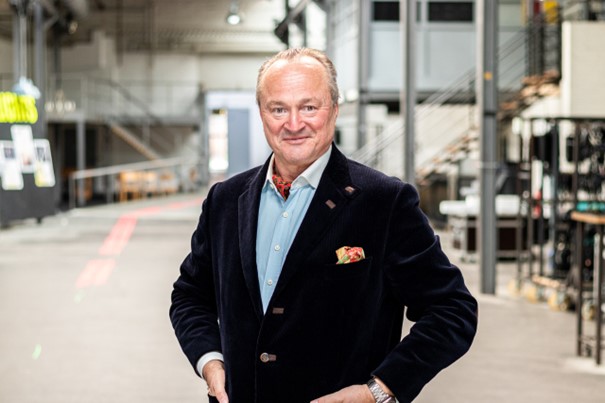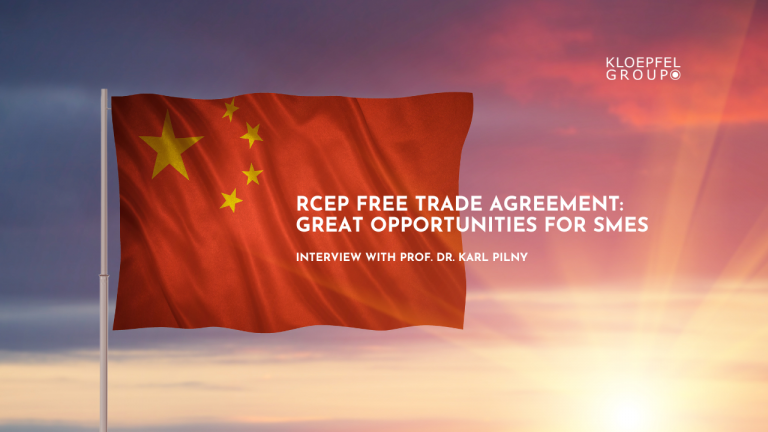Interview with Prof. Dr. Karl Pilny
RCEP free trade agreement: great opportunities for SMEs
Southeast Asia is also a great opportunity for another reason, as we have had an important free trade zone here with 15 countries since 2022 in the form of the Regional Comprehensive Economic Partnership agreement (RCEP). What advice would you like to give companies in this regard?
Under RCEP, up to ninety, ninety-five percent of tariffs and import duties are to be eliminated in most industries. Or certificates of origin, or Letters of Origin are also easier to manage within RCEP. RECP is therefore a potentially powerful global gamechanger in terms of economic policy.
The agreement covers ten ASEAN countries, i.e. the Southeast Asian states such as China, Thailand, Japan, South Korea, Indonesia, Vietnam, Myanmar, Singapore and others plus Australia and New Zealand. Only India is not included for political reasons, as Prime Minister Narendra Modi is playing the Indian self-sufficiency card and is thus increasingly in a competitive relationship with China.
To be sure, some complain that the 2022 RCEP agreement is not yet working as well as thought. For example, there were too few forms and the like. But in my opinion, this free trade zone definitely has what it takes to radically reshape the global economy in the next ten or fifteen years.

If a German company operates in one of the member countries of RCEP, this has enormous potential sales opportunities. The bureaucratic procedures are significantly reduced, they can operate much more cost-efficiently and so on.
The ones who have done the best job of this so far are the Japanese. But the Chinese are also looking very hard at RECP. Against the backdrop of RCEP, they are in the process of setting up parallel supply chain structures to benefit in the Southeast Asian member countries.
Where do you see risks for German companies?
As far as the risks for German companies are concerned, we don’t have to go into such detail. We know that in certain areas, such as pharmaceuticals, we have become far too dependent on China and India. That must be corrected and reversed in any case. I am Chinese through and through. By that I mean the “both/and” mindset. We should do one without leaving the other. We need rapid diversification of supply chains within Asia, and we should take advantage of the great opportunities offered by the RCEP agreement.
I am not a fan of hasty steps, such as closing Chinese sites just because of the human rights situation. For example, we now have the supply chain law. This is a typical example of excessive bureaucracy in Germany and double standards.

What conclusion would you like to draw for our readers?
I would like to expressly praise the middle class. There is a lack of sufficient China or Asia expertise in German politics. But if there is any, it is in the SME sector. I think the SME sector has done a very good job over the last twenty years of taking advantage of the opportunities that China and Asia have offered.
I encourage companies not to bury their heads in the sand. Rather, with a sober strategic approach, it is important to modify the cooperation. To this end, SMEs must no longer regard China as an extended workbench or a low-cost production location. It is also possible to produce cheaply in Eastern Europe, for example. In many business areas and industries, China and other parts of Asia are becoming increasingly innovative. It is therefore very important to stay on the ball in order to remain competitive in terms of technological edge.
In addition, the opportunities for cooperation must be seen and exploited. But with a clear view and with a certain caution. That’s why I once again advocate not demonizing China and Asia, but also not idealizing it. Instead – in true Chinese fashion – we should do one thing without abandoning the other. That means looking out for its interests, keeping its crown jewels with it, also in terms of technology transfer, but nevertheless taking advantage of the opportunities and perhaps also considering a few innovative new ideas and new paths. RCEP in particular offers companies great opportunities to be active with other Asian partners and in China.
Here are more parts of the series “Understanding China’s Soul
Part 1: Why medium-sized companies should not turn their backs on China and Asia altogether
Part 3: China is aiming to be the world leader: What is their secret to success
Part 4: Understanding the Politicization of China’s Economy
About Prof. Dr. Karl Pilny

The international business lawyer Prof. Dr. Karl Pilny is considered one of the most profound experts on Asia in the German-speaking world. The Japanese-speaking investment expert has lived in Asia for many years and has accompanied numerous investments in and to Asia over the past thirty years. Prof. Dr. Pilny is managing director of the consulting company asia21 GmbH in Zurich, which specializes in market entries in Asia, and has also been active as an entrepreneur and business angel for many years. With Dealmaker.io GmbH and the Asia Strategy Institute at the BWA in Berlin, he helps European entrepreneurs to successfully enter Asian markets and accompanied Asian companies on their way to Europe.
In addition to a strong network in politics, business and science, Pilny is a sought-after keynote speaker and author of various books with a connection to Asia. His trilogy “The Asian Century” is particularly well known. This was published by Campusverlag and includes “The Asian Century” (East Asia), “Dance of the Giants” (South Asia) and “Tiger on the Leap” (Southeast Asia). Furthermore, his “Investment Guide Asia” was published in 2010 by Finanzbuchverlag Munich. “Asia 2030 – what’s in store for the global economy”, the continuation of the trilogy, was nominated for the getAbstract International Book Award in 2019.
Co-founder and managing director of Dealmaker.io GmbH
Prof. Pilny is co-founder and managing director of Dealmaker.io GmbH. This is of interest to readers when it comes to how to set up in Asia, how to find local partners on the ground, or how to react when Asian and Chinese companies restructure supply chains from their perspective, for example. As a digital transaction advisor, Dealmaker.io also helps with all questions relating to the sale of companies.
Contact:
Kloepfel Group
Christopher Willson
Tel.: 0211 941 984 33
Pempelforter Str. 50
40211 Duesseldorf
Mail: rendite@kloepfel-consulting.com
